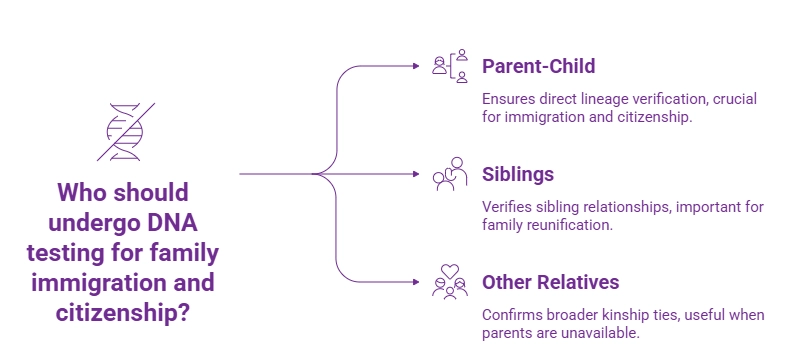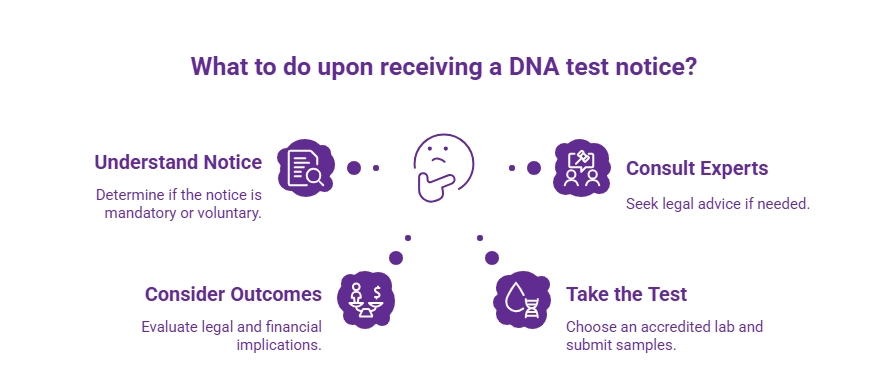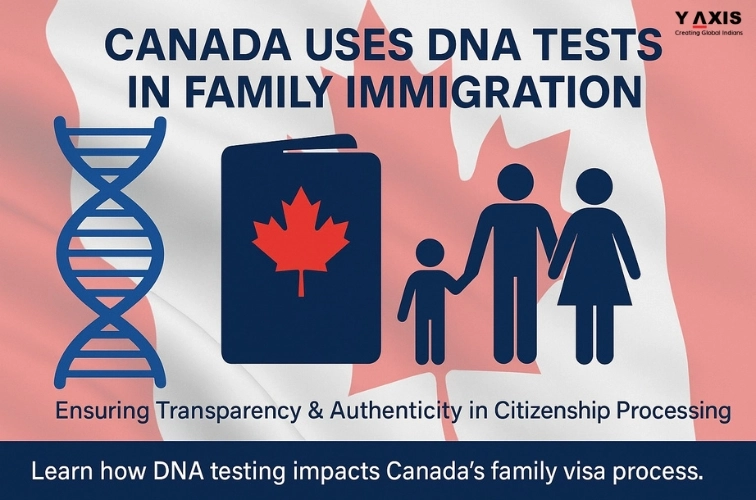Posted on September 17 2025
How Canada Uses DNA Tests As Part Of Family Immigration and Citizenship Processing?
By , Editor
Updated February 15 2026
Canada uses DNA tests to verify family relationships in case of insufficient documentation, particularly for family immigration and citizenship processing. IRCC approves and accepts DNA tests done in verified labs as proof of relationships. Individuals who fail to submit the required documentation as evidence of biological relationships for family immigration would be required to undergo the DNA tests.
DNA tests taken for family immigration and citizenship processing will be considered the last option to prove your relationship in the absence of necessary documentation, particularly for parent-child and sibling relations. Applicants must take complete responsibility and bear the full costs of the DNA test; failure to do so can delay visa applications and, in some cases, can also cause visa rejections.
*Want to migrate to Canada? Sign up with Y-Axis for complete assistance with the process.
Frequently Asked Questions:
What is the DNA test for immigrants?
Canada does not always ask for DNA tests for family immigration; the IRCC only requests a DNA test when the submitted documentation, such as adoption papers or birth certificates, fails to confirm family ties or relationships between the sponsor and applicant. Before requesting a DNA test, authorities will conduct an interview and issue a Procedural Fairness Letter (PFL). Applicants who do not clear this will have to undergo a DNA test, which will be the last option to legally confirm the relationship.
The IRCC officials will explain their concerns regarding the application and reasons for needing a DNA test. Applicants who are asked to take the DNA test are always given an option of whether or not to get it done. Those who voluntarily do it will have a chance of testifying their relationship, while those who opt out often end up with refused applications because they cannot prove their relationships.
Who may be tested?
Generally, parent-child, siblings, and other kinship relationships are asked to undergo a DNA test for family immigration and citizenship processing.
Parent-child relationships:
- Child
- Mother & father (if required and possible)
Note: The DNA test can also be done in the absence or unavailability of one parent.
Siblings and other relationships:
- Siblings
- Parents (or their siblings)
- Other relatives or kinship (blood relatives)

*Need assistance with Canada immigration? Consult experts at Y-Axis to help you with the process.
DNA Testing process in Canada
DNA testing is an official process required for Canadian immigration. It must be done when the applicant cannot submit proper documentation to prove the relationship between themselves and the sponsor. It is mainly done as part of family immigration and the Canadian citizenship process. The DNA test can be done from within Canada and overseas. The process usually involves collecting cheek swabs with a buccal swab, followed by a chain of custody protocol to ensure the sample is intact.
Given below is a complete step-by-step guide to help you understand the DNA testing process:
DNA Test in Canada
Here is a step-by-step process of how the DNA test is done in Canada:
Step 1: IRCC issues a DNA letter to the applicant or client
Step 2: The applicant chooses an SCC-accredited lab
Step 3: An appointment will be booked for the DNA sample submission
Step 4: The applicant must arrange the requirements for the DNA test (IRCC-issued DNA letter, two ID proofs, two copies of the latest passport-sized photographs, and a signed consent form confirming your approval for the test)
Step 5: The applicant attends the appointment and submits the above requirements
Step 6: Await the results.
Things the lab must do:
- The lab must properly verify the applicant’s identity and the documentation
- The sample kit must be untouched and not tampered with
- Complete the custody record
- The sample must be sent to the lab via fast shipping in a secure manner
- The samples must be delivered within 7 days
Here is a step-by-step process of how the DNA test can be done outside Canada:
DNA test for immigration:
Step 1: IRCC contacts the migration offices abroad and coordinates with them
Step 2: Applicants can then schedule a DNA test at the nearest local migration office
Step 3: The migration officer will be present throughout the collection and oversee the shipping of the sample.
DNA test for Citizenship:
- The DNA test will be managed by the migration or Canadian consular offices
- The coordination of the process will be done based on the applicant’s location and the parent in Canada
The IRCC provides remote witnessing for the DNA sample collection, which will be done via the International Organization for Migration (IOM) at select locations. The DNA test samples will be collected on site, and the video taken will be verified and approved by the immigration officer.
Also read…
How to get Canadian citizenship after Canadian immigration?
Who is authorized to conduct the DNA tests?
Many Canadian organizations and companies are permitted to conduct DNA tests for immigrants. Private companies in Canada, like Forensics Canada Inc. and Canadian DNA Services, are authorized to perform the DNA tests. However, Standards Council of Canada (SCC) accredited labs will only be accepted by the IRCC. Registered DNA experts from these companies will collect the samples from the testing labs and send them to the respective workplaces.
How much does a DNA test cost in Canada?
No standard fee is set for the DNA test, as it is only required upon IRCC request. The cost of the DNA test may differ based on the lab and generally range from CAD 400 to CAD 800 for a single test. The cost may also vary based on the relationship to be tested and the total number of individuals doing the test.
What should you do when you receive a notice for the DNA test?
A notice for a DNA test is usually issued only when IRCC needs further verification of the relationship between the applicant and the sponsor.
Here are some steps you can follow when you receive a notice for the DNA test:

Step 1: Understand the nature of the notice
You must first determine whether the notice was court-ordered (mandatory) or a voluntary request (optional)
Step 2: Be thorough with the legal and financial outcomes
You would be required to go to a court and a judge who has ordered the test, whereas for a voluntary request, refusing to take the test can affect the process for which the test is being done.
Step 3: If you decide to take up the test
First, locate a lab accredited by trusted organizations such as the American Association of Blood Banks (AABB). Then, submit the DNA samples to the healthcare provider, who will send them to a lab for analysis.
Step 4: Consult experts (if required)
Consult a trusted advocate if the test is needed for legal proceedings.
*Are you looking for step-by-step assistance in applying for Canada PR? Contact Y-Axis, the world’s No. 1 overseas immigration consultancy, for end-to-end assistance!
Frequently asked questions
1. When does IRCC request DNA tests in family immigration or citizenship applications in Canada?
IRCC requests a DNA test in family immigration or citizenship applications only in the absence of sufficient evidence to testify to the biological relationship between the sponsor and applicant. In cases where the submitted documentation is not sufficient to establish the relationship between parent-child and siblings, IRCC will send a DNA notice. The DNA test acts as the final option to prove the biological relationship. IRCC only accepts and approves DNA tests in accredited Standards Council of Canada (SCC) labs.
2. Is DNA testing mandatory for all sponsorship or citizenship cases?
No, a DNA test is not mandatory for all sponsorship or citizenship cases. It is generally required only when there is insufficient evidence to verify biological relationships (parent-child or siblings) for family immigration applications. Even in such cases, the DNA test is not mandatory, and the applicants can choose whether or not to take the test. It is a voluntary decision that the applicant must take as the final step to prove their biological relationship. The applicant must bear all the costs involved in the DNA test.
3. Who may need to provide DNA samples for such tests?
Canadian immigration applicants and their family members (parents or siblings) might have to provide DNA test samples to prove their relationship. DNA test samples are required when the documents submitted are insufficient to establish a biological relationship between family members, particularly for family immigration and citizenship applications. The visa applicant and the Canadian sponsor must undergo the DNA test and provide samples.
4. Which laboratories are accepted by IRCC for DNA tests?
IRCC only accepts DNA tests from Standards Council of Canada (SCC) - accredited laboratories. Some of the leading labs in Canada, such as Genetrack, DNA Diagnostics Center (DDC), and Dynacare, offer IRCC-approved and SCC-accredited DNA testing. To find the right lab for your DNA test, go through the official SCC website or contact the companies mentioned above to check for their confirmation and availability.
5. What is the required accuracy or probability level for DNA test results?
IRCC approves an accuracy or probability level of 99.8% or more for saliva-based DNA test results. The DNA test must be done at an SCC-accredited laboratory to be considered.
6. What is the procedure for DNA sample collection inside and outside Canada?
DNA test sample collection can be done inside and outside Canada. IRCC issues an official letter to the applicant requesting a DNA test be done in an SCC-accredited laboratory.
The process for DNA sample collection in Canada is as follows:
Step 1: IRCC sends a DNA notice letter
Step 2: You must select an SCC-accredited lab in Canada
Step 3: Schedule an appointment at the selected lab
Step 4: Provide the documentation (ID proof, DNA letter issued by IRCC, two copies of passport-sized photographs)
Step 5: Sign the consent form that testifies your approval to share the DNA test results with IRCC
Step 6: A registered lab technician will conduct the DNA test
Step 7: The samples, once collected, will be shipped for analysis by the migration officer.
The process for DNA sample collection outside Canada is as follows:
Step 1: IRCC notifies the family member or applicant who is outside Canada about the DNA test
Step 2: The DNA test kit will be sent to the nearest migration office or consulate
Step 3: The consular office will then contact the family member and schedule a DNA sample collection.
Step 4: A Canadian migration officer will supervise the DNA testing process
Step 5: Upon completion, the officer will securely pack the parcel and ship it to the testing lab.
Note: IRCC checks with the International Organization for Migration (IOM) to virtually witness the testing process in remote locations.
7. Who pays for the DNA test and associated costs?
The beneficiary or the applicant pays for the DNA test and all its associated costs. Once IRCC issues a letter requesting a DNA test, it is up to the applicant whether or not to take it. The decision is a voluntary choice, and the applicant is required to bear the full costs of the test. The amount required for a DNA test must be paid well in advance to the SCC-accredited lab conducting the test.
8. How are DNA test results handled, and what happens if the test does not confirm the claimed relationship?
The DNA test results are generally handled by comparing the genetic results of the applicant and the sponsor, which helps determine the biological relationship. Here is a step-by-step guide on how the DNA test results are handled:
Step 1: Collecting the DNA test samples of the concerned individual
Step 2: The sample is then sent to the laboratory for further analysis
Step 3: The lab then compares the DNA profiles to establish the relationship
Step 4: The test results are then interpreted, and a detailed report is submitted
Step 5: The DNA test results are generally sent as digital reports to maintain privacy.
9. Could asking for a DNA test delay the immigration or citizenship process?
Yes, asking for a DNA test will definitely postpone the immigration or citizenship process. The DNA test could further extend the process as it will involve several steps, from finding a certified SCC-accredited lab to getting the test done. The DNA test results themselves could take up to a few weeks.
10. Can alternate documentation replace DNA testing if it is available?
No, there is no alternate documentation to replace DNA testing. The DNA test is often considered the last option to verify the biological relationship between the applicant and sponsor for family immigration and citizenship applications. It is the only non-documentary option for proving biological relationships. General documentation can be submitted as proof of relationship, but if the document is insufficient or fails to prove the relationship, IRCC issues a notice for DNA testing.
11. What should applicants do if they refuse to undergo the DNA test?
Applicants who refuse to undergo the DNA test may risk having their application rejected or refused on the basis of a lack of relationship. In such cases, applicants can either re-apply with updated information or appeal the decision. While the DNA test is a voluntary choice, it is recommended and advised that applicants get it done, as refusing to do so may lead to application refusal.
Tags:
Canada family immigration and Citizenship processing
Canada immigration pathways
Canada citizenship
Canadian citizenship processing
Canada PR
Migrate to Canada
Canada visas
Family immigration
DNA test for immigration
DNA tests for Canadian family
Share
Options for you by Y-Axis
Get it on your mobile
Get News alerts
Contact Y-Axis

